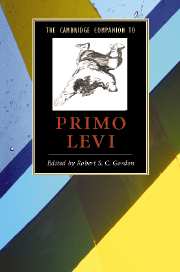1 - Primo Levi’s Turin
from Part I: - Cultures
Published online by Cambridge University Press: 28 November 2007
Summary
Turin was Primo Levi's city. Born, bred and schooled there, he lived at number 75 Corso Umberto for the entirety of his life, save two forced absences, the first as a consequence of the Racial Laws when he found work in Milan, the second during his detention in the death camps. Turin and the cultural climate that had grown up in and around the city in the post- Risorgimento period onwards were vital components of Levi's world. Without placing him within this context it is hard for us to understand him fully as a writer, as a witness and as an individual. If Levi can be characterized not only as a rationalist, a late Enlightenment intellectual with a sceptical, analytical mind and faith in the power and integrity of positivist science, but also as someone who held dear a progressive liberal and anti- Fascist set of values, that is in no small part due to the cultural history of Turin.
Turin as capital
The Turin of the generation of Cesare Levi (1878-1942), Primo's father, was a city on the rebound from a period of crisis and humiliation. In the light of what Turin and Piedmont represented for Italy at unification it made sense that Turin be designated Italy's first capital. The city itself, and the Piedmont region with it, were by far the most modern and enlightened of the states that made up pre-Risorgimento Italy; city and region boasted an entrepreneurial middle class and a forward-looking ruling class; the city was on a par, or almost, with the nation that was its northerly neighbour and with which it enjoyed close contact: France.
- Type
- Chapter
- Information
- The Cambridge Companion to Primo Levi , pp. 3 - 16Publisher: Cambridge University PressPrint publication year: 2007
- 1
- Cited by

